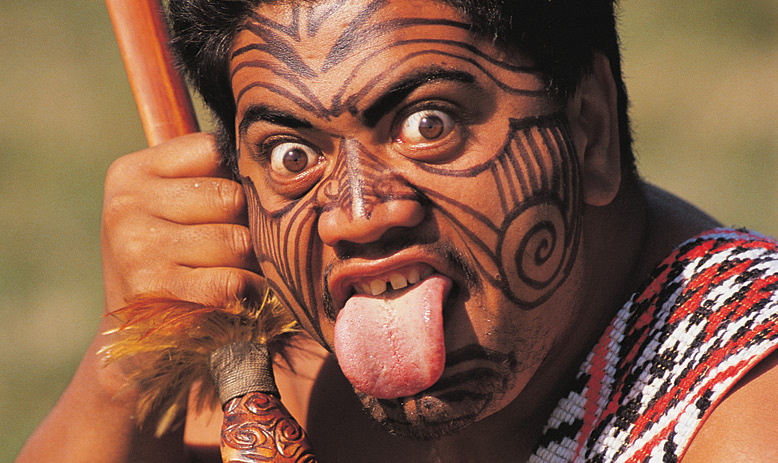
War is the father and king of everything; some he has made gods, and some men; some slaves and some free.
Heraclitus
~~~~~~~~~~~~~~~~~~~~~~~~~~~~~~
Is war man’s natural state? Are there any tribes which are more warlike than others due to their peculiar genetic traits? Are some religions “bloodthirstier” than others? Do some ideologies lead inevitably to war?
In plainer words, the question is: Why people make war?
We could give an answer if we used some groups of people (perhaps entire nations) as guinea pigs, putting them in different conditions and see if they will go to war, but that would be non-deontological – to say the least. Luckily for us, nature – which doesn’t give a damn about deontological ethics – ran an experiment with real humans which lasted for about 800 years.
It was launched in 1.000AD at the Pacific Ocean.
~~
New Zealand’s main islands were immigrated for the first time in 1.000AD. Some Polynesians were the first people who set foot on this fertile land.
Their descendants were named Maori. A few years later some Maori found themselves accidentally on Chatham Islands, 800 kilometers east of metropolis. Those people were named Moriori.
The two societies never came in contact again, so much so that Moriori forgot about the existence of metropolis and Maori were ignorant about Chatham Islands. They evolved separately for at least 500 years.
~~
That’s how the experiment begins. We have the same race, the same genetic traits, the same Polynesian religion and the same history (oral, since they had no written word).
What is different? The environmental conditions, the place. Will the two societies evolve differently? And what will happen if they meet again?
The northern (and hotter) island of New Zealand was conducive for intense agriculture and wherever agriculture is developed, the population increases.
The Maori multiplied exponentially within 500 years and they reached 100,000 people. Food surpluses allowed the formation of political organization – and drones, on the side. They had leaders, priests and warriors who produced nothing except for the wars between the rival clans.
The food surpluses resulted also in the specialization of some gunsmiths who now produced more advanced weapons, as well as artists who constructed temples and sculptures.
Maori created civilization, the way we perceive civilization where the man is the fuel; a society of inequality.
They became formidable fighters since they were constantly into war. Even the British Empire which outgunned them had a hard time to subdue them (if it ever did).
~~
On the other hand, Moriori lived on Chatham Islands where the climate is subarctic. The large crops of Polynesia could not flourish in these places. Moreover, Chatham Islands are remote from any other island. Moriori, descendants of farmers and maritime explorers, became necessarily hunter-gatherers.
Without food surpluses they couldn’t feed the specialized craftsmen, artists, leaders and warriors; instead they had to seek their own food, their leader included.
The Moriori population never exceeded 2,000. Since there were no accessible islands around to immigrate, they had no other option but stick around and learn how to survive and live together. They kept the population in check via various methods (one of them was to castrate some male babies) while they renounced war. The result was a small, non-warlike population with primitive technology and guns, deprived of formal organization or strong leadership.
~~
We have seen it before, it is historically established, all hunter-gather societies were equalizing. There were no inequalities because there was no food surplus.
It was after the Agricultural Revolution (around 10,000BC) which rendered the food surplus feasible complete with the capacity to store it that the first cities, kingdoms and empires began to form in Eurasia.
But also this was the way that what we call civilization came into being, namely big art monuments, technology and guns, standing armies, religions with clergy, bureaucracy, laws and judges, kings (and philosophers and scientists). There has to be accumulation of goods in order that inequality exists, it is necessary to develop specialization, to make the nuclear bomb, but also to invent the dishwasher.
The 21st century is a glaring proof of this when the production of goods is higher than ever before in human history and the inequalities are scandalizing (Jeff Bezos, the richest man on earth makes in a day as much as an employee of his would earn in a million years).
But the society of Moriori never created “civilization” (neither philosophers, nor laptops) and when they were confronted with Maori, they could not make a stand against them.
~~
In 1835 an Australian ship that was hunting seals discovered (again) the isolated Chatham Islands. It broke the news to New Zealand.
On the 9th of December, 1835, a ship with 500 Maori reached Chatham Islands. They entered the villages and announced to the locals that from now on they had become their slaves.
Mariori could resist because they outnumbered Moriori, but they had tradition of resolving issues peacefully. They called a meeting and they decided not to fight, but offer peace, friendship and distribution of the sources instead.
Maori attacked. In the next days they killed hundreds of Moriori, men, women and children. They roasted and ate some of them, some others left them to rot and they took some others as slaves.
~~
It sounds horrendous, but it is only common in human history: the powerful, namely those who possess more (food, guns, technology, germs) prevail over the weak ones.
Men don’t make war because it is a trait of some race or religion or ethnic group or gender, but because they can win (or, at least, they think it is likely); and also because they want to have more.
Religions, ideologies and economic theories simply rationalize man’s irrational greed.
And it is irrational, because it is leads nowhere.
~~~~~~~~~~~~~~~~~~~~~~~~~~
I drew inspiration from Jared Diamond’s book “Guns, Germs and Steel”.
~~~~~~~~~~~~~
Sanejoker’s FB page:
https://www.facebook.com/sanejoker
Translated by Alexandros Mantas:
https://open.spotify.com/album/0NhHCYv4TBP5JcD9qDkuXQ



